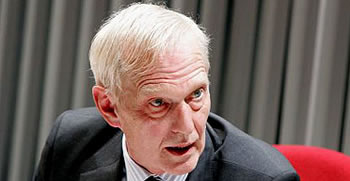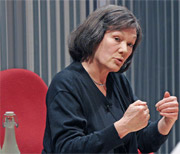
Crimes of the P.M.
By Terry Stoller
Called to Account: The Indictment
of Anthony Charles Lynton Blair for the Crime of Aggression Against
Iraq: A Hearing
Edited by Richard Norton-Taylor
The Tricycle Theatre
269 Kilburn High Road
London
Box office: 020-7328-1000
The Tricycle Theatre in northwest London,
which has been staging verbatim government inquiries since 1994,
this year initiated its own investigation. Director Nicolas Kent
enlisted two lawyers, Philippe Sands and Julian Knowles, to hold
hearings in January and February 2007 on the question: is there
a basis for indicting Tony Blair as a war aggressor? Edited by
Guardian journalist Richard Norton-Taylor, who has compiled
most of the Tricycle’s verbatim plays, the proceedings have become
its latest tribunal play: Called to Account: The Indictment
of Anthony Charles Lynton Blair for the Crime of Aggression Against
Iraq: A Hearing.
Testimony for Called to Account
is drawn from voluntary sources inside and outside government.
The eleven witnesses who appear onstage include Richard Perle,
chair of a Pentagon advisory group during the leadup to the war
in Iraq; former U.N. weapons inspector Scott Ritter; an Iraqi
Kurd living in Britain; a Chilean ambassador to the U.N.; British
journalists and officials; Tory and Labour Members of Parliament,
most notably Clare Short, now an Independent Labour M.P. who in
spring 2003 resigned her Cabinet post.
A key issue in the play is the advice of
Blair’s Attorney General, Lord Goldsmith, on the legality of going
to war, which seemed to change over a ten-day period in March
2003, easing the path to war. Other concerns explored: whether
the intelligence on weapons of mass destruction was manipulated;
the real impetus for going to war; the timing of Blair’s commitment
to military action; and the leaked “Downing Street memo” of July
2002, which revealed that Blair and other top British government
officials had been informed that the U.S. believed military action
in Iraq was “inevitable” and that “the intelligence and facts
were being fixed around the policy.”
As in his other tribunals, Kent has replicated
the hearing room, this time an uncluttered one, dominated by a
U-shaped table with chairs for the legal teams and a witness.
Plasma screens, which have become a staple of the Tricycle’s tribunals,
project the written evidence that the lawyers refer to, drawing
the audience into a consideration of the statements and deeper
into the event.
 In
any verbatim play, the actor’s challenge is to re-present a real
person. In this production, actress Diane Fletcher appears to
channel Clare Short. Even if you’re not familiar with Short’s
actual vocal and physical mannerisms, which I’m not, audience
comments and laughter of recognition corroborate the many reviews
that complimented the performer for being on the mark. Fletcher’s
Short oozes disdain for “Tony,” his method of governing by informal
groups of personal appointees, his dispensing charm while telling
lies. Short was concerned in February 2003 that Blair would not
wait for U.N. authorization of the war and decided to consult
with the Prime Minister’s wife. When the prosecution asks why
she took that step, her response is just a bit eccentric. She
was getting “desperate” about international law, she says, and
thought, “Well, Cherie is a human rights lawyer and you know,
she and Tony have a very close relationship—why not give it a
try?”
In
any verbatim play, the actor’s challenge is to re-present a real
person. In this production, actress Diane Fletcher appears to
channel Clare Short. Even if you’re not familiar with Short’s
actual vocal and physical mannerisms, which I’m not, audience
comments and laughter of recognition corroborate the many reviews
that complimented the performer for being on the mark. Fletcher’s
Short oozes disdain for “Tony,” his method of governing by informal
groups of personal appointees, his dispensing charm while telling
lies. Short was concerned in February 2003 that Blair would not
wait for U.N. authorization of the war and decided to consult
with the Prime Minister’s wife. When the prosecution asks why
she took that step, her response is just a bit eccentric. She
was getting “desperate” about international law, she says, and
thought, “Well, Cherie is a human rights lawyer and you know,
she and Tony have a very close relationship—why not give it a
try?”
A core group of actors regularly appear
in the tribunals, and those I’ve spoken to express pride about
their involvement in this important body of political theater
work. Thomas Wheatley portrays Sands who represents the prosecution,
overseeing the inquiry with intense concentration and a probing
intelligence. David Beames as Scott Ritter is an outspoken cowboy-like
American, telling it like it is about WMD. William Hoyland (who
portrayed Donald Rumsfeld in the Tricycle’s verbatim play about
Guantánamo Bay) plays two government officials, one a worldly-wise,
almost flippant commissioner for the British intelligence services.
Asked how Blair in March 2003 could be “unequivocal” in his belief
that Iraq had breached the 2002 U.N. resolution calling for disarmament
and further inspections, he replies, “Your guess is as good as
mine.”
The aim of the hearing is to test the evidence,
and Called to Account can be slightly dry at times, but
it is mostly engrossing. Past tribunals at the Tricycle have had
strong emotional centers, as in The Colour of Justice
(1999), about the police investigation into the murder of a young
black man, and Bloody Sunday (2005), about the 1972 killing
of Irish civil rights marchers by British soldiers in Londonderry.
In Called to Account, although they are not the focal
point, the ghosts of tens of thousands of people who have died
in Iraq since the war began hover over the proceedings. As an
American watching the play, I couldn’t help feeling the government
leader who must be held accountable for the Iraq tragedy is President
George W. Bush.
Called to Account is framed with
the arguments by the prosecutor and the defense, delivered directly
to the audience. In the end, it’s not clear that there are indeed
legal grounds for a case against the Prime Minister. But as in
all its other verbatim plays, the Tricycle has provided its audience
with a keen exploration of a critical issue as well as a good
night out.
